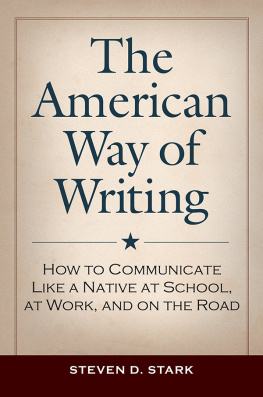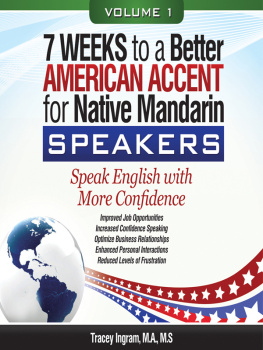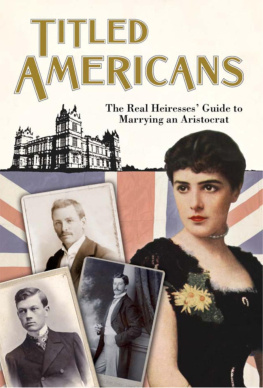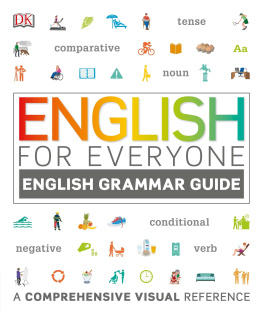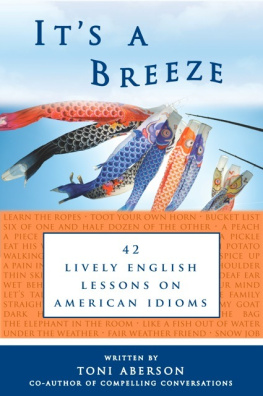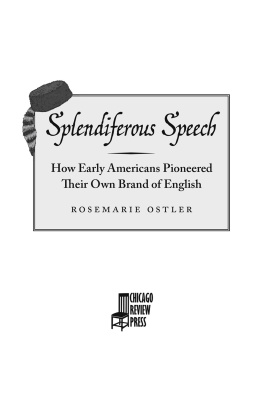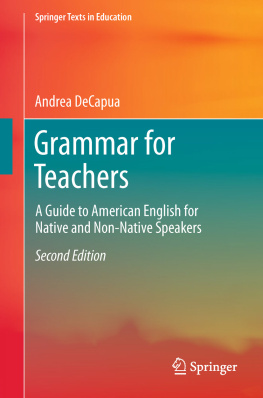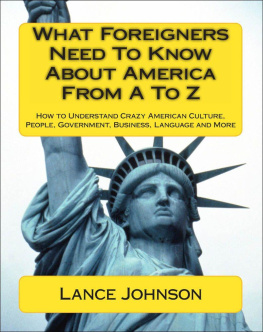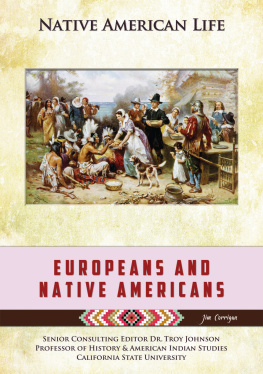The American Way
of Writing
The American Way
of Writing
HOW TO COMMUNICATE LIKE A
NATIVE AT SCHOOL, AT WORK,
AND ON THE ROAD
Steven D. Stark

Copyright 2019 by Steven D. Stark
All rights reserved. No part of this publication may be reproduced, stored in a retrieval system, or transmitted, in any form or by any means, electronic, mechanical, photocopying, recording, or otherwise, except for the inclusion of brief quotations in a review, without prior permission in writing from the publisher.
Library of Congress Cataloging-in-Publication Data
Names: Stark, Steven D., author.
Title: The American way of writing: How to communicate like a native at school, at work, and on the road / Steven D. Stark.
Description: Santa Barbara, California : Praeger, An Imprint of ABC-CLIO, LLC, 2019. | Includes bibliographical references and index.
Identifiers: LCCN 2019014458 (print) | LCCN 2019019630 (ebook) | ISBN 9781440871368 (alk. paper) | ISBN 9781440871375 (ebook)
Subjects: LCSH: English languageUnited StatesRhetoric. | English languageUnited StatesUsage. | Americanisms. | Report writing. | English languageSocial aspectsUnited States. | English languageVariation. | National characteristics, American.
Classification: LCC PE1408 (ebook) | LCC PE1408 .S6855 2019 (print) | DDC 808/.0420973dc23
LC record available at https://lccn.loc.gov/2019014458
ISBN: 978-1-4408-7136-8 (print)
978-1-4408-7137-5 (ebook)
23 22 21 20 19 1 2 3 4 5
This book is also available as an eBook.
Praeger
An Imprint of ABC-CLIO, LLC
ABC-CLIO, LLC
147 Castilian Drive
Santa Barbara, California 93117
www.abc-clio.com
This book is printed on acid-free paper 
Manufactured in the United States of America
To Pat Waldwho in her integrity and urge to do whats right,
embodied much of what is best about America
Contents
Acknowledgments
As always, there are a ton of people to whom Im grateful. Thanks, first, to Pat Wald and Tony and Peter Rotundo for their careful review of various versions of the manuscript. Thanks, too, to my agentsSonali Chanchani and Frank Weimannfor all their advice and patience. At Praeger and beyond, I benefited from a lot of help and wise counselfrom Hilary Claggett, who signed the book up, to all my editors (and now friends) who gave me such valuable feedback and assistance: Michelle Scott, Nicholle Robertson, Erin Ryan, Sheryl Rose, Kevin Downing, Kristen Beach, Ann Bailey, and many others whom I should be naming but have somehow overlooked. My bad, as they say. Harry and Jake contributed in dozens of unspoken ways by allowing me to see the world through their eyes when we lived overseas. As always, the most thanks go to Sarah Wald, who reviewed countless drafts, endured endless discussions, and put up with a lot of the usual. Trite but true: I couldnt have done it without her.
Introduction: Setting the Stage
I got into this field by accident. Years ago, I was teaching an advanced legal writing seminar for third-year students at Harvard Law School, when a colleague asked if I could give some special sessions for advanced degree international students whose primary language was not American English.
The request turned into a lifetime preoccupation. What I quickly learnedas others have before meis that language is a window into the soul of a culture. In the same way one can learn about a people through its literature, its food, and yes, even by the way it plays soccer at the World Cup (as I wrote in a previous book), one can learn even more through its language.
Its not just a process of cultural exploration, as enriching as that can be. Learn a new language, and you become a new person, goes the old Arab proverb. Despite a fair amount of academic disagreement as to whether an individual language can shape a worldview, no one disputes the notion that it reflects one.
We are not captives of our tongues, but we are citizens of our languages, is the way the New Yorker writer Adam Gopnik once put it. And citizenship is a broad concept that includes behavior and rituals.
Ive found the hardest part for newcomers who want to master American English is not learning the alphabet, grammar, and extensive vocabulary, as challenging as those may be. Its understanding what makes Americans tick and the myriad of ways that gets reflected in their language and behavior. Echoing Gopnik, if you dont know the way Americans use English and why, you cant thrive in American workplaces and schools.
When foreign students come to me with a language problem it is often a cultural or a political problem, William Zinsser, the author and writing teacher at Yale once said. Learning to write well in American English ultimately entails understanding the unique way Americans view the world.
Thats what this book is about. Its also what makes it different. Its aimed at non-native writers and speakers who come to the U.S. to study, as well as international business and legal professionalsboth outside and inside the U.S.who have to work and communicate with Americans in a professional or business context. Its based on my research and experience over the years teaching thousands of students and professionals both in the States and abroad, and it reflects what clients and students have told me they see as the major issues confronting those who must learn to communicate fluently in American English.
This first volume focuses on writing, not public speaking or face-to-face conversation and presentation skills. (Thats upcoming in Volume II.) It assumes the reader is already competent in Englishat least as far as language courses and the TOEFL (the international English proficiency test) goyet is one who finds that on the ground, theres something elusive about the American language and those who write it that even the most advanced courses never seem to teach.
Part of the problem is that anyone who comes to another language begins by writing in a way that reveals his or her native tongue and outlook. (This is known in the linguistic trade as interference.) Looking at it in reverse, when I write in French, you can tell Im American, and not just because I make grammatical errors a native speaker wouldnt make. I do American things in my writing because I bring my English-speaking approach to the French world. I probably seem too informal to a French reader. I tend to be more direct than a French native. And I rely on French words that are similar to the words I use in English (the semi-technical term for this in the trade is false friends).
The same thing happens going the other way. With English, its not just that speakers of Slavic languages tend to have trouble with articles such as a and the because their language doesnt have them. (Hence the way Russians in English movies will often say, Go to room, and investigators were able to find deceptive U.S. Facebook posts by Russians because their creators did something similar.) And its not just that some Asian language speakers may have difficulties with English verb tenses because their languages dont have them, at least in the same way. Those are the easier parts of the transition.
The harder challenges come when those same speakers of an Asian language have to learn to be as direct as an American, which can involve nothing less than a kind of personal transformation at odds with their cultures and traditions. Similarly, the French are apt to find the way English is used to be far more confrontational than the nuanced styles to which they are accustomed. Theres a reason French was the traditional language of diplomacy. Following the Gallic model, it enabled warring parties to be clear yet indirect enough to stay in the same room talking. Good English writing often does much the opposite.
Next page
